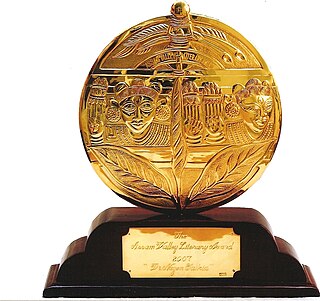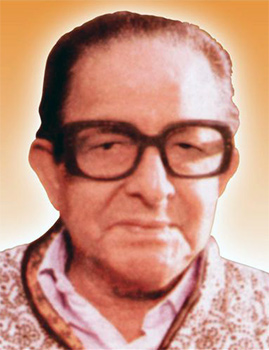Indian poetry and Indian literature in general, has a long history dating back to Vedic times. They were written in various Indian languages such as Vedic Sanskrit, Classical Sanskrit, Ancient Meitei, Modern Meitei, Telugu, Tamil, Odia, Maithili, Kannada, Bengali, Assamese, Hindi, Marathi and Urdu among other prominent languages. Poetry in foreign languages such as English also has a strong influence on Indian poetry. The poetry reflects diverse spiritual traditions within India. In particular, many Indian poets have been inspired by mystical experiences. Poetry is the oldest form of literature and has a rich written and oral tradition.
Bhabendra Nath Saikia was a novelist, short-story writer, editor and film director from Assam, India. Saikia received his doctorate in physics from the University of London. He began his career as a reader in the Department of Physics, University of Guwahati. He later played an important role in the publication of college level textbooks in the Assamese language during his tenure as the Secretary of the Co-ordination Committee for production of textbooks in regional languages.
Parvati Prasad Baruva (1904–1964) was a noted poet, lyricist, and dramatist: an icon of Assamese literature and the culture of Assam. Known for his simple and sensitive use of the Assamese language, he is popularly known as the Geetikavi; the lyrical poet of Assam. He was also one of the early pioneering filmmakers of Assamese cinema.

The Assam Valley Literary Award was conceived in the year 1990 by Williamson Magor Education Trust to honour creative writers who have enhanced Assamese literature.

Nabakanta Barua was a prominent Assamese novelist and poet. He was also known as Ekhud Kokaideu. As Sima Dutta he wrote many poems in his early life.

Birendra Kumar Bhattacharya was an Indian writer. He was one of the pioneers of modern Assamese literature. He was the first ever Assamese writer to receive the Jnanpith Award, which was awarded to him in the year 1979 for his novel Mrityunjay (Immortal), followed by Indira Goswami in 2001. He was also a recipient of Sahitya Akademi Award in Assamese in 1961 for his Assamese novel Iyaruingam, which is considered a masterpiece of Indian literature. In 2005, a translation of the work published by Katha Books with the title Love in the Time of Insurgency was released. Another famous novel written by Bhattacharya is Aai (Mother).

Literature from North East India (Assamese: উত্তৰ-পূৱ ভাৰতৰ সাহিত্য is literature in the languages of North East India and the body of work by English-language writers from this region. North East India is an under-represented region in many ways. The troubled political climate, the beautiful landscape and the confluence of various ethnic groups perhaps have given rise to a body of writing that is completely different from Indian English literature. North-East India was a colonial construct and continues to be one by virtue of having a historically difficult relationship with the Indian nation state.
Nilmani Phookan was an Indian poet in the Assamese language and an academic. His work, replete with symbolism, is inspired by French symbolism and is representative of the genre in Assamese poetry. His notable works include Surya Henu Nami Ahe Ei Nodiyedi, Gulapi Jamur Lagna, and Kobita.

Nalini Bala Devi was an Indian writer and poet of Assamese literature, known for nationalistic as well as mystical poetry. She was awarded the Padma Shri by the Government of India in 1957 for her contribution to literature, and 1968 she won the Sahitya Akademi Award given by Sahitya Akademi for her poetry collection Alakananda. She is the first woman Assamese poet to be awarded with Padma Shri and the first lady to the chair the Assam Sahitya Sabha.

Chandra Kumar Agarwala was a writer, poet, journalist from Assam. He is a pioneer of the Jonaki Era, the age of romanticism of Assamese literature. Agarwala was titled as Pratimar Khonikor in Assamese literature. Agarwala was the first editor and financer of the Jonaki magazine and a founder member of Asamiya Bhasa Unnati Sadhini Sabha, a literary organization of Assam with his intimate friends Lakshminath Bezbarua and Hemchandra Goswami. Agarwala, along with his friend Lakshminath and Hemchandra, are known as "Trimurti of Assamese literature" for their remarkable contribution to the very beginning of modern Assamese literature. Chandra Kumar Agarwala was the brother of writer and poet Ananda Chandra Agarwala and uncle of Jyoti Prasad Agarwala, a noted poet, playwright, composer, lyricist, writer and first Assamese Filmmaker.
Ananda Chandra Barua (1907–1983) was a writer, poet, playwright, translator, journalist and actor from Assam. He is popularly known as Bokulbonor Kobi in Assamese literacy society. He was honoured with, most notably the Padma Shri title and Sahitya Akademi award.
Bijoy Sankar Barman is an Indian poet, writer and translator who writes in Assamese language. He has been awarded with Yuva Puraskar by Sahitya Akademi

Sananta Tanty was an Indian poet of Assamese literature. Tanty was born to an Odia family in Kalinagar Tea Estate. Tanty completed his secondary education at a Bengali-medium school but continued his literary works in the mainland Assamese language. Tanty received numerous awards and distinctions, including the 2018 Sahitya Akademi Award for "Kailoir Dinto Amar Hobo", a collection of his poems.
Mihir Kumar Jha, better known by his adopted pseudonym "Mihir Vatsa", is an Indian poet and writer. He won the Sahitya Akademi Yuva Puraskar in 2022 for his travel memoir Tales of Hazaribagh: An Intimate Exploration of Chhotanagpur Plateau. After Hansda Sowvendra Shekhar, he is the second writer from Jharkhand to win the Yuva Puraskar award in English language. Tales of Hazaribagh received critical acclaim upon publication and was ranked among the top non-fiction books in 2021.
Sutapa Chakraborty is a Bengali poet. She is the first person from Assam to receive the Yuva Puraskar for literary work in Bengali language.

Nayanjyoti Sarma is an Assamese short story writer, author, Wikimedian and physician. He is currently working at Sushrusa Hospital in Nalbari. Sarma received the Munin Borkotoky Literary Award in November 2023 for his collection of short stories, Jaal Kota Jui. For same book he received Sahitya Akademi Yuva Puraskar for Assamese in 2024. Additionally, he was awarded the Pragjyotishpur Literature Award-2023 at the Pragjyotishpur Literature Festival, held from September 29 to October 1 in 2023.







